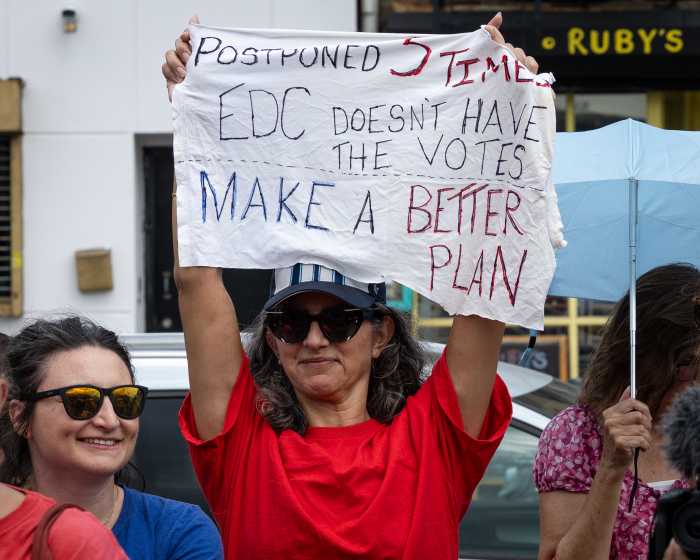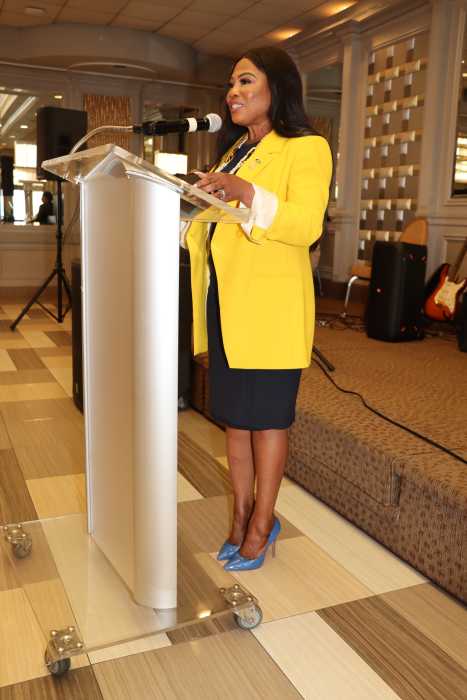Human Rights Campaign study shows benefits of corporate competition for LGBT workers, customers
Results from the fifth annual formal survey of corporation workplace and marketplace behavior regarding LGBT Americans conducted by the Human Rights Campaign show that the number of employers performing well in six major categories has experienced a ten-fold increase since 2002.
The Corporate Equality Index 2006, released this week by HRC, the nation’s largest gay rights group, based in Washington, found that 138 companies—out of 446 leading employers for which the group could glean sufficient information—scored a perfect 100 this year, up from 101 last year and just 13 in 2002.
HRC began with a universe of more than 1,500 major corporations, and through surveys and publicly available information was able to rate the 446 in the Index.
Criteria on which the companies were rated include: sexual orientation nondiscrimination and diversity training policies; the same efforts on gender identity and expression, including the provision of at least one transgender-specific “wellness benefit;” equal participation in partner benefits programs as compared to legal spouses; an employee LGBT resources group supported by the company; “appropriate and respectful” advertising and participation in gay community events; and the lack of any action that would “undermine” LGBT equality.
HRC noted improvements on each of these six major criteria. Significantly, the most dramatic up-ticks occurred in the establishment of nondiscrimination policies based on gender identification and expression (a 75 percent increase from 116 to 203) and in the provision of transgender-related health benefits (which grew from 185 to 303, or a 64 percent increase). Such benefits for transgendered employees include mental health counseling, hormone therapy, gender reassignment surgical procedures, and short-term leave for that surgery. Fully 67 companies out of the 446 provide all of the transgender-specific health benefits HRC identified, including surgical procedures coverage. This marks a dramatic expansion of the availability of coverage for this costly component of health care for many gender-variant individuals.
According to Daryl Herrschaft, the study’s author and director of HRC’s Workplace Project, the reasons for the dramatic improvements during the past five years are simple—market forces that, ironically, have made the private sector a more reliable friend to the LGBT community than government, where much of the energy of the gay rights movement has traditionally been focused.
“What we’re seeing is an intense competition within industries to achieve a competitive edge,” Herrschaft said, noting that more than half of the Fortune 500 companies now offer domestic partnership benefits.
The goals of workplace fairness have now become “mainstream business practice” which has made American companies “more productive [with a] better work product, better bottom line,” Herrschaft said.
One specific example of how the competitive process has worked within a specific industry is aerospace. Last year, Raytheon became the first company in that sector to achieve a perfect score. This year, Honeywell, Boeing, and Northrop Grumman joined the list of 100-rated companies.
According to Herrschaft, industries where progress is lagging include engineering and construction, forest and paper products, mail and freight delivery, tobacco, and transportation and travel.
Three of the 446 companies surveyed scored a zero—ExxonMobil, Meijer, a grocery chain, and Perot Systems, a high-tech consulting firm.
Beyond the impressive growth in perfect scores among leading corporations, it is also noteworthy that the average rating among all 446 in the survey was 76 percent, which demonstrates that corporate America is moving broadly and decisively toward LGBT-friendly policies. Those industries with the highest number of perfect scores were banking and financial services, with 19; law, with 12; and high technology, with 10. Though tobacco was noted as a lagging industry, with no companies showing perfect scores, the industry average was in fact 90 percent.
Those states with the largest number of perfect-scoring companies headquartered there are New York, with 30, California, with 27, Illinois, with 13, and New Jersey with 9. That breakout, however, may be as reflective of where corporate headquarters are concentrated as anything else.
Several corporate officials who joined HRC Tuesday in a press call announcing the results echoed the group’s views on what accounted for the progress.
Louise Young, a senior software engineer at Raytheon who has long been an activist in the shareholder movement that has worked for at least the past decade in pressing for friendly LGBT policies across corporate America, talked about coming out of the closet in the early 1970s when she met her life partner, and losing a teaching job in 1975 because she was a lesbian.
“I’ve been a witness to great change, especially in corporate America,” Young said. “A major driver has been the HRC workplace index. I am so proud of my company. It’s not only the right thing to do, it’s good business practice. Our leaders get it.”
She said Raytheon has adopted the right policies, but has also worked to publicize them widely.
“It makes business the focus, not the anxiety of losing a job,” she said. “I know this is true because I’ve lived it.”
Maria Ferris, the director of global workplace diversity at IBM, placed her company’s LGBT policies in the context of a long history of broadening opportunities for emerging worker groups. The policies she pointed to not only included efforts aimed at diversifying the IBM workplace but also in establishing programs to develop LGBT-owned suppliers for the company.
HRC was asked how to account for the 100 percent rating for Coors, the beer company still owned to a significant degree by the founding family, several prominent members of whom have been longtime funders of right-wing, anti-gay organizations. Herrschaft explained that the design of the index does not incorporate quantitative measures about the contributions major shareholders and company officers make to groups antagonistic to the LGBT community. Through an extensive review of Securities and Exchange Commission and other public information, however, HRC does document such activity and its overall database highlights that information.
Herrschaft said that in addition to Coors, Unum Provident, an insurer, and Qwest Communications, a telephone, Internet, and wireless service provider, also fell into that category.
gaycitynews.com





























